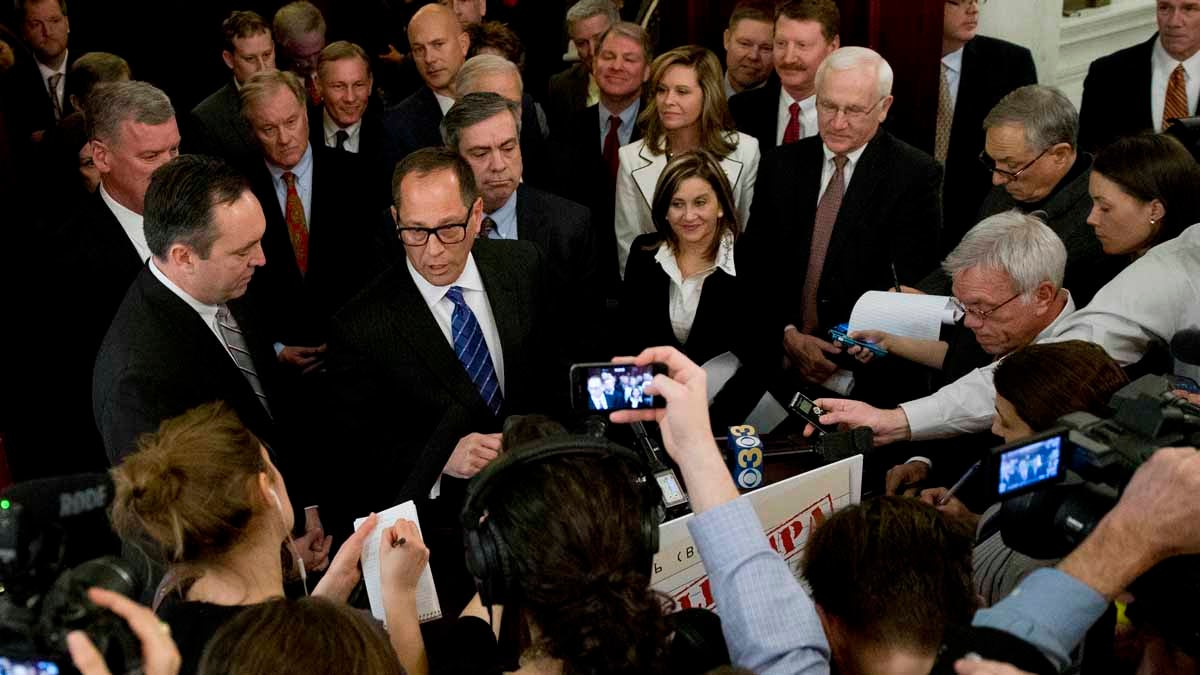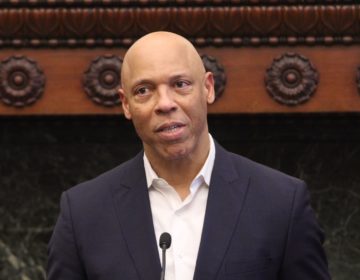GOP lawmakers seek to stop Pa. education funding lawsuit at preliminary hearing
The lawsuit challenging Pa.’s school-funding scheme continued its slow climb through the legal system with oral arguments before the Commonwealth Court in Philadelphia.

Pennsylvania Senate President Pro Tem Joe Scarnati, center, hopes to quash a school funding lawsuit brought by districts and advocates. (AP file photo)
The lawsuit challenging Pennsylvania’s school-funding scheme continued its slow climb through the legal system Wednesday with oral arguments before the Commonwealth Court in Philadelphia.
Lawyers for State Senate President Pro Tempore Joe Scarnati, State House Speaker Mike Turzai, and the Pennsylvania Board of Education proffered a series of preliminary injunctions that could stall the case and even, theoretically, nullify it. But lawyers from both sides indicated in oral arguments that the case will likely move forward in some form.
The hearing Wednesday could shape the timeline of the case, as well as the arguments permitted if the suit gets to a full trial.
“I don’t see any scenario where this case doesn’t go forward,” said Brad Elias, lead attorney for the plaintiffs at Wednesday’s hearing. “To me it’s just a question of how successful they are at slowing us down.”
Lawyers for Scarnati and Turzai said they were not authorized to comment on the case.
In November 2014, a group of school districts and advocacy groups sued the state, claiming it had underfunded public schools so severely it had violated the Pennsylvania constitution.
In September, after an initial round of trials, the state Supreme Court reversed decades of precedent and determined the courts had the authority and ability to judge whether the state had met its constitutional mandates. With that hurdle cleared, advocates hope to put the state’s education funding system on trial.
Before they can do that, they’ll have to maneuver past the preliminary injunctions raised Wednesday.
Defendant objection #1: the case is now moot
Scarnati and Turzai both argue the state’s recent adoption of an education funding formula nullifies the lawsuit as originally argued. The formula, first used in the 2015-16 school year, distributes money based on each district’s relative need, enrollment, and student poverty rate.
“The new funding formula is intended to provide sufficient, predictable, and equitable funding for school districts across the Commonwealth,” wrote Turzai’s lawyers in his brief. “Because the Petition is based on a funding formula that is no longer in place … the Petition should be dismissed as moot.”
It’s possible the Commonwealth Court justices could force the plaintiffs to amend their complaint based on the installation of a new funding formula. If that happened, the case could go through another round of preliminary objections.
“I think the worst-case scenario, based on how the argument went today, is that they ask us to file an amended complaint and the case moves forward on a slightly different timeline,” said Brad Elias, who conducted the oral argument on behalf of the plaintiffs.
Elias and his team note that only a small percentage of education funding passes through the new formula, not nearly enough, they say, to close the gap between wealthy and poor school districts.
Judge Michael Wojcik, elected as a Democrat in 2015, summed up the plaintiffs’ argument with a mishmash of references.
“You’re basically saying they’re rearranging the deck chairs and we need a bigger boat,” he said.
Defendant objection #2: the equal protection clause
When districts and advocates sued the state, they argued the current funding system violates two parts of Pennsylvania’s constitution.
One of those sections is the equal protection provision.
The basic argument here is that, in addition to being insufficient, the state’s system for funding education is egregiously unfair. Poor school districts with low-value properties struggle to raise the revenue high-wealth districts can raise through real estates taxes. The state, plaintiffs claim, does not do enough to even out these disparities.
Lawyers for Turzai and Scarnati say that’s a misreading of the equal protection provision, and the state isn’t obligated to even out disparities. Education funding, they argue, is a matter of local effort and local control.
A scheme based on local taxation, with natural disparities occurring between districts, is a “rational” system for disbursing education dollars, lawyers for the Republican lawmakers argued.
“The fact that Petitioners disagree with the General Assembly’s policy decisions determining the manner to fund education, however, does not render those decisions irrational,” Turzai’s attorneys wrote in their brief.
Of the $30.8 billion spent on public education in Pennsylvania, $10.6 billion comes from state government, $18.4 billion is raised locally, and a little less than a billion comes from the federal government, according to the data most recently published by the Pennsylvania Department of Education.
The plaintiffs say in this case, local control is an illusion because low-wealth districts can’t raise the funds needed to even the playing field. In essence, they have no control because they are hamstrung by fiscal realities.
Turzai’s argument, the plaintiffs wrote in their brief, “disregards the limitations on local control caused by the paucity of financial resources in low-wealth districts.”
“We think they’re extraordinarily vulnerable to a claim of inequality,” said Michael Churchill, one of the attorneys for the plaintiffs.
Churchill also thinks the presence of the new funding formula helps the plaintiffs because it lays out what a fair distribution system would look like. If the state believes its new formula to be fair, but only pushes a small amount of total education dollars through it, Churchill argued, then the majority of funding must be distributed unfairly.
Defendant objection #3: the education clause
The education clause in the Pennsylvania constitution requires the General Assembly to “provide for the maintenance and support of a thorough and efficient system of public education to serve the needs of the Commonwealth.”
The plaintiffs say funding levels in some school districts are so low students aren’t receiving a “thorough and efficient” education.” This claim isn’t about inequity, but rather inadequacy.
It’s important to note here a split between Turzai and Scarnati. Turzai’s attorneys acknowledge that the case should move to trial on this argument and that the two sides should be able to debate the merits of the claim.
Scarnati’s lawyers disagree, and lodged a preliminary objection to the education clause claim. They argued that it would be difficult to establish a causal relationship between the amount of money a school district spends and student outcomes. Thus, how could the courts determine whether a district receives enough money to provide a “thorough and efficient” education?
In a previous hearing, defense attorneys claimed that setting up any system of public education — no matter how robust or woeful — covers the state’s legal obligation.
The plaintiffs’ attorneys say they’ll provide more evidence at a full trial, but alluded to poor building conditions and lack of technology in some schools as evidence of inadequacy.
Also at issue: standards of review
The sides also jousted over what “standard of review” the courts should use when evaluating the lawsuit’s claims.
This gets pretty deep in the legal weeds, but it could tip the scales if the case reaches a full trial.
If the courts determine education to be an important or fundamental right under the Pennsylvania constitution, the justices will subject the arguments made to “intermediate” or “strict” scrutiny. In other words, it’ll be tougher for the defendants to prove they haven’t violated the constitution. They’d have to prove the state has a compelling interest in keeping the status quo.
If the courts rule the other way, the defense will merely have to prove there’s a “rational basis” for the current funding system.
These are all mini-decisions on the way to an ultimate decision, but they could give one side a better chance of prevailing in the end.
WHYY is your source for fact-based, in-depth journalism and information. As a nonprofit organization, we rely on financial support from readers like you. Please give today.






